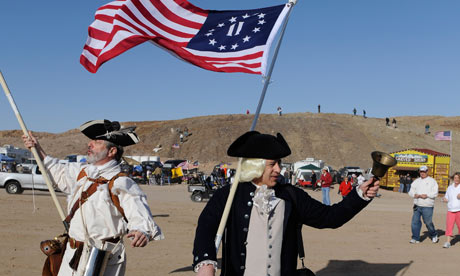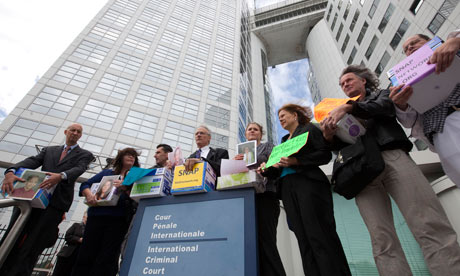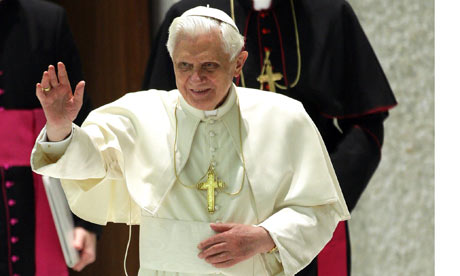
'People will forgive you for being wrong, but they will never forgive you for being right - especially if events prove you right while proving them wrong.' Thomas Sowell
Search This Blog
Thursday, 6 September 2012
You can't dance to atheism

Saturday, 17 September 2011
The biblical foundation for a celibate priesthood is flimsy, and now cracks are beginning to show in the Catholic church's ban on marriage for those in holy orders
The troubled history of priests, sex and the church may be at a turning point
In a new autobiography published this week, Father Edward Daly, former bishop of Derry and the handkerchief-waving priest of the famous Bloody Sunday photograph, has called for an end to the celibacy rule for Catholic priests. Pointing to the severe decline in numbers of serving clergy (while the worldwide Catholic population has almost doubled since 1970, the number of priests has remained virtually static), Daly believes crisis could be averted by allowing priests to marry. Many see clerical celibacy as fundamental to the church, but in fact it is a religious tradition rather than a strict scriptural prohibition, and it has been far from universally observed throughout its history.
The biblical foundation for a celibate priesthood is flimsy. While Saint Paul recommended celibacy, he thought anyone who cannot "contain themselves" should marry, "for it is better to marry than to be burnt" (1 Corinthians 7:9). Further, the Gospels spoke of apostles who were married, with no hindrance to their ministry. But the model of Christ's own celibacy (emulated by the priest acting "in persona Christi") marked it out as a higher calling, and ultimately an unmarried priest would be more committed to his religious duties, his celibacy giving him the "power to attend upon the Lord, without impediment" (1 Corinthians 7:35).
The first official attempt to impose celibacy on those in holy orders was made at the Council of Elvira (c 306), and efforts to enforce it followed throughout the middle ages. But how it played out in practice varied enormously, and stories of married clergy and fornicating popes abounded. Pope John XII was accused by a 10th-century synod of having "fornicated with the widow of Rainier, with Stephana his father's concubine, with the widow Anna, and with his own niece, and he made the sacred palace into a whorehouse".
Unperturbed by such examples, the First and Second Lateran Councils in the 12th century decreed that clerical marriages were invalid, but Thomas Aquinas asserted a century later that this was not the decree of God, but merely church law, reversible by papal or conciliar authority. Indeed, in the middle ages the prohibition of marriage had less to do with spiritual concerns than the conservation of church property. Married priests meant legitimate heirs and the loss of church assets through inheritances – something that couldn't be countenanced.
The 16th-century Council of Trent confirmed the celibacy rule (just as the Church of England was abolishing it), but it was only in the 20th century that priestly celibacy, along with all matters of sexual morality, became an obsession for the church hierarchy. Following the reforms of the Second Vatican Council, Pope Paul VI issued the encyclical Sacerdotalis Caelibatus, reaffirming the fundamental value of celibacy as allowing "a closer and more complete relationship with the mystery of Christ and the Church for the good of all mankind".
Yet the encyclical also permitted the possibility of married clergy from other Christian traditions being ordained as Catholic priests, and cracks began to show in the edifice. Although Pope Benedict rejected the idea of married priests in 2006, he has since taken up Paul VI's baton by allowing defecting married Anglican ministers to enter the church.
The absolute prohibition on married Catholic priests has gone, and with suggestions (of debatable credibility) of a link between the church's child abuse crisis and celibacy, last year's plaintive call for the abolition of the rule from Italian women romantically involved with priests, and the proliferation of groups advocating a married priesthood, a new chapter in the troubled history of priests, sex and the church may be opening.
- © 2011 Guardian News and Media Limited or its affiliated companies. All rights reserved.
Why the Pope must face justice at The Hague

When it comes to holding the Catholic Church accountable for sexual abuse of children by members of the clergy, all roads lead to Rome. That is what my organisation, Survivors Network of those Abused by Priests (Snap), concluded after years of seeking justice in other venues and being turned away.
On 13 September, we travelled to the Hague to file an 84-page complaint and over 20,000 pages of supporting materials with the International Criminal Court, documenting our charge that the Pope and Vatican officials have tolerated and enabled the systematic and widespread concealing of rape and child sex crimes throughout the world.
Holding childhood photographs that tell a wrenching story of innocence and faith betrayed, and joined by our attorneys from the New York-based Center for Constitutional Rights, we stood up and demanded the justice that has so long been denied. The New York Times called the filing "the most substantive effort yet to hold the pope and the Vatican accountable in an international court for sexual abuse by priests".
No doubt, many people of faith are shocked that we would accuse a world church leader of crimes against humanity – a man considered by many to be infallible. But the man who is infallible must also be accountable.
By the Vatican's own account, "only" about 1.5-5% of Catholic clergy have been involved in sexual violence against children. With a reported 410,593 priests worldwide as of 2009, that means the number of offending priests would range from 6,158 to 20,529. Considering that many offenders have multiple victims, the number of children at risk is likely in the tens, or even hundreds, of thousands.
We believe the thousands of pages of evidence we filed this week will substantiate our allegations that an operation has been put in place not only to hide the widespread sexual violence by priests in all parts of the world, but also to obstruct investigation, remove suspects out of criminal jurisdictions and do everything possible to silence victims, discredit whistleblowers, intimidate witnesses, stonewall prosecutors and keep a tighter lid than ever on clergy sex crimes and cover-ups. The result of this systematic effort is that, despite a flood of well-publicised cases, many thousands of children remain vulnerable to abuse.
While many pedophile priests have been suspended in recent years, few have been criminally charged and even fewer defrocked. Worse, no one who ignored, concealed or enabled these predators has suffered any consequences. At the head of this hierarchy of denial and secrecy is the Pope, who has served as an enabler of these men. We believe the Vatican must face investigation to determine whether these incidences have been knowingly concealed and clergymen deliberately protected when their crimes have come to light.
I know this story well, because I was sexually abused by a parish priest, from my time in junior high school until graduation. Because of the shame and trauma, several years passed before I was able to tell anyone. By that time, it was too late to file criminal charges. Church officials refused to restrict that priest's access to children or take action against him for several more years, despite other victims coming forward.
Indeed, powerful factors prevent all but the most assertive, healthy and lucky victims from seeking justice. Many others succumb to drugs, anorexia, depression or suicide when the pain of innocence betrayed becomes too much to bear. A recent investigation in Australia revealed a case in which 26 among the numerous victims of a particular priest had committed suicide.
For the safety of children and the prevention of yet more heinous wrongdoing, the International Criminal Court may be the only real hope. What other institution could possibly bring prosecutorial scrutiny to bear on the largest private institution on the planet?
Our journey for justice has been a long one, and it's not over yet. But we know where it must end: with justice at The Hague.
Wednesday, 14 April 2010
The pope should stand trial
Why is anyone surprised when Christopher Hitchens and I call for the prosecution of the pope? There is a clear case to answer
- Richard Dawkins
- guardian.co.uk, Tuesday 13 April 2010 14.00 BST

Pope Benedict XVI ... 'severely shaken' by the abuse cases. Photograph: Franco Origlia/Getty Images
Pope Benedict XVI is the head of the institution as a whole, but we can't blame the present head for what was done before his watch. Except that in his particular case, as archbishop of Munich and as Cardinal Ratzinger, head of the Congregation for the Doctrine of the Faith (what used to be called the Inquisition), the very least you can say is that there is a case for him to answer. See, for example, three articles by my colleague Christopher Hitchens here, here, and here. The latest smoking gun is the 1985 letter obtained by the Associated Press, signed by the then Cardinal Ratzinger to the diocese of Oakland about the case of Father Stephen Kiesle, mercilessly analysed by Andrew Sullivan here.
Lashing out in desperation, church spokesmen are now blaming everybody but themselves for their current dire plight, which one official spokesman likens to the worst aspects of antisemitism (what are the best ones, I wonder?). Suggested culprits include the media, the Jews, and even Satan. The church is hiding behind a seemingly endless stream of excuses for having failed in its legal and moral obligation to report serious crimes to the appropriate civil authorities. But it was Cardinal Ratzinger's official responsibility to determine the church's response to allegations of child sex abuse, and his letter in the Kiesle case makes the real motivation devastatingly explicit. Here are his actual words, translated from the Latin in the AP report:
"This court, although it regards the arguments presented in favour of removal in this case to be of grave significance, nevertheless deems it necessary to consider the good of the universal church together with that of the petitioner, and it is also unable to make light of the detriment that granting the dispensation can provoke with the community of Christ's faithful, particularly regarding the young age of the petitioner.""The young age of the petitioner" refers to Kiesle, then aged 38, not the age of any of the boys he tied up and raped (11 and 13). It is completely clear that, together with a nod to the welfare of the "young" priest, Ratzinger's primary concern, and the reason he refused to unfrock Kiesle (who went on to re-offend) was "the good of the universal church".
This pattern of putting church PR over and above the welfare of the children in its care (and what an understatement that is) is repeated over and over again in the cover-ups that are now coming to light, all over the world. And Ratzinger himself expressed it with damning clarity in this smoking gun letter.
In this case he was refusing the strong request of the local bishop that Kiesle should be unfrocked. Vatican standing orders were to refer such cases not to the civil authorities but to the church itself. The current campaign to call the church to account can take credit for the fact that this standing order has just changed, as of Monday 12 April 2010. Better late than never, as Galileo might have remarked in 1979, when the Vatican finally got around to a posthumous pardon.
Suppose the British secretary of state for schools received, from a local education authority, a reliable report of a teacher tying up his pupils and raping them. Imagine that, instead of turning the matter over to the police, he had simply moved the offender from school to school, where he repeatedly raped other children. That would be bad enough. But now suppose that he justified his decision in terms such as these:"Although I regard the arguments in favour of prosecution, presented by the local education authority, as of grave significance, I nevertheless deem it necessary to consider the good of the government and the party, together with that of the offending teacher. And I am also unable to make light of the detriment that prosecuting the offender can provoke among voters, particularly regarding the young age of the offender."
The analogy breaks down, only in that we aren't talking about a single offending priest, but many thousands, all over the world.
Why is the church allowed to get away with it, when any government minister who was caught writing such a letter would immediately have to resign in ignominy, and face prosecution himself? A religious leader, such as the pope, should be no different. That is why, along with Christopher Hitchens, I am supporting the current investigation of the pope's criminal complicity by Geoffrey Robertson QC and Mark Stephens. These excellent lawyers believe that, for a start, they have a persuasive case against the Vatican's status as a sovereign state, on the basis that it was just an ad hoc concoction driven by internal Italian politics under Mussolini, and was never given full status at the UN. If they succeed in this initial argument, the pope could not claim diplomatic immunity as a head of state, and could be arrested if he steps on British soil.
Why is anyone surprised, much less shocked, when Christopher Hitchens and I call for the prosecution of the pope, if he goes ahead with his proposed visit to Britain? The only strange thing about our proposal is that it had to come from us: where have the world's governments been all this time? Where is their moral fibre? Where is their commitment to treating everyone equally under the law? The UK government, far from standing up for justice for the innocent victims of the Roman Catholic church, is preparing to welcome this grotesquely tainted man on an official visit to the UK so that he can "dispense moral guidance". Read that again: dispense moral guidance!
Unfortunately I must end in bathos, with a necessary correction of a damaging error in another newspaper. The Sunday Times of 11 April, on its front page, printed the headline, "Richard Dawkins: I will arrest Pope Benedict XVI." This conjures up – as was doubtless intended – a ludicrous image of me ambushing the pontiff with a pair of handcuffs and marching him off in a half Nelson. Blood out of a stone, but I finally managed to persuade that Murdoch paper to change the headline in the online edition.Never mind headlines invented by foolish sub-editors, we are serious. It should be for a court to decide – a civil court, not a whitewashing ecclesiastical court – whether the case against Ratzinger is as damning as it looks. If he is innocent, let him have the opportunity to demonstrate it in court. If he is guilty, let him face justice. Just like anybody else.
Get a free e-mail account with Hotmail. Sign-up now.
